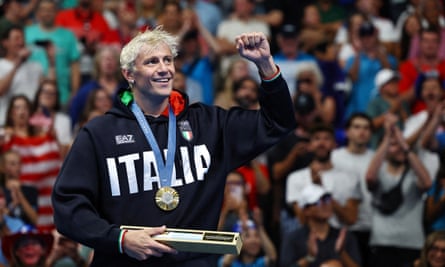Some of the swimmers waved when they stepped on to the dark pool deck for the men’s 100m breaststroke final, some of them punched the air, pressed their hands together in prayer, or cupped their hands to their ears. Adam Peaty did not so much as flicker his eyes left or right. The defending Olympic champion walked straight ahead to the blocks, and set himself for the race ahead. Win it, as he did in Rio and Tokyo, and he would become the third swimmer in history, after Michael Phelps and Katie Ledecky, to win gold in the same event at three consecutive Olympic Games.
He lost. A minute later, 59.05sec to be precise, Peaty touched the wall in second. He was just two-hundredths behind the Italian Nicolò Martinenghi, who was out in lane seven. So it was silver, and he even had to share it with Nic Fink from the USA, who finished dead level with him.
Qin Haiyang, Peaty’s great Chinese rival, was well back behind all three of them in seventh place. He and Peaty had been neck-and-neck through the first 50m, and at halfway Qin was five-hundredths of a second up. But Qin slipped back through the second 50m. Peaty won that race, but found himself, all of a sudden, in another one against Fink and Martinenghi.
It was the first time anyone had ever beaten Peaty in an individual Olympic race. He took it with good grace. As soon as the results were out, he made his way over to lane seven and wrapped Martinenghi up in a hug.
So it turned out that behind Peaty’s inscrutability as he walked out into the arena, there was a small and unfamiliar doubt. He knew, underneath, that after what he has been through in recent years, when he has struggled with drink and depression, and gone through what his mother Caroline described as a hell of a lot of “suffering”, he didn’t have enough of the old stuff in him. Not any more.
Peaty’s time was well over a second down on what he was capable of, once, and did not even rank among the top 25 he has turned in across his career. He was even a little quicker back at the British trials in April, and if he could have only matched what he had done then again now, he would have won comfortably enough.
Immediately afterwards, Peaty held back tears as he spoke about how hard it had been to even make it to the start line here, and said he was happy that he couldn’t have done any more. Still, he looked pretty rueful as he walked off the podium with that silver medal around his neck. At least he did until he met his son, and wrapped him up in a hug.
But against that, the truth is that living the way he did back when he was winning everything took a hell of a lot out of him, and led, in large part, to the breakdown he suffered 18 months ago.

If Peaty’s mum gets her way, this will be the last time he competes. She said she wants him to finish swimming and “have some kind of normality now”. And if his silver here came in exchange for a little peace of mind, then maybe the gold was worth forgoing.
Because swimming can be a thankless sport. Just ask Max Litchfield, who went in the 400m individual medley an hour before Peaty and Qin stepped on to the pool deck. Litchfield is 30. This was the Briton’s third Olympics, his third final, and his third fourth-place finish.
after newsletter promotion
In 2016 he was a second and a half behind the Japanese bronze medallist Daiya Sato. In 2020, he was two-tenths of a second behind the Australian bronze medallist Brendon Smith. And in 2024 he was, again, two-tenths of a second behind the US bronze medallist Carson Smith. Two-tenths is just a little less time than it takes to blink an eye.
Litchfield has suffered a lot along the way, he came through a shoulder injury that almost finished his career in 2017, and after it a personal crisis, which he has always refused to talk about, that forced him to skip a world championships. That meant, in turn, that he had his funding cut. But he fought his way back here to the final again and was out there fighting with the six other swimmers for second place behind the French phenomenon Léon Marchand, who was so far in front of everyone else that his only competition was the world record he set last year.
Marchand didn’t catch it, quite, he was half a second off, but his time of 4min 2.5sec easily beat the Olympic record set by Michael Phelps back in 2008. It was the sort of performance Peaty used to make a habit of.
The French media were still clamouring around Marchand an hour later. There will be challenges ahead for him too, too, he is about to win a fame, and come under a strain, that Peaty has learned all too much about over the years.